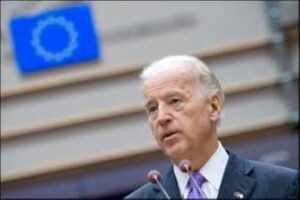Ahead of the US Elections in 2024, polls taken recently suggest that Democrats are becoming more doubtful about President Joe Biden leading the party for another term, mainly because of worries about his advanced age and fitness for office. This opinion is supported by a Rasmussen Reports study, in which 48% of Democrats said they would like a new leader to head the party in the upcoming election. These worries are a result of Biden’s age and doubts about his capacity to lead successfully for an additional term.

Popular Democrat Contenders and Their Appeal
Though many Democrats are open to the prospect of a different contender, perspectives on who should succeed Biden differ. Michelle Obama, the former first lady, is one of the names that has gained the most support (20% of respondents).
She is not the only candidate being thought about, though. Also, with far less fervour, former Secretary of State Hillary Clinton and Vice President Kamala Harris were also named. Fifteen percent of respondents supported Harris, while twelve percent supported Clinton.

In addition to these well-known individuals, other qualified applicants are being taken into consideration. Eleven percent of probable voters back California Governor Gavin Newsom, despite his accused of running a “shadow” campaign. At fifty-two, Michigan Governor Gretchen Whitmer was the youngest candidate listed, and she garnered support from nine percent of prospective Democratic voters.
Diverse Perspectives and Unresolved Questions
But even with so many choices available, a large portion of Democratic participants—roughly 27%—stated that they were unhappy with every candidate that was brought up and could not think of a better option than Biden. This feeling indicates a lack of agreement on the best possible course of action and highlights the intricacy of the party’s decision-making process.
It is important to remember that, even while there are growing conversations inside the Democratic Party about possible Biden substitutes, no firm choices have been made on who will run in the 2024 elections. Party members having differing perspectives are a reflection of a wider range of factors, such as electability, leadership abilities, policy alignment, and the capacity to inspire and unify the party’s grassroots support.

A complex interaction of internal party dynamics, public opinion, and larger societal trends are likely to have an impact on the final choice of a presidential candidate as the political environment continues to change and multiple factors shape the decision-making process.











Comments 1